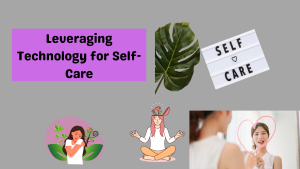
Leveraging Technology for Self-Care: A Modern Approach to Well-Being
- Modern Self-Care and Technology
- Self-Care Apps: Your Wellness Partner
- Wearable tech tracks your health
- Online therapy and support
- Using Smart Home Technology to Relax
Introduction
Technology is intimately intertwined with our everyday lives, so it’s no wonder it’s a solid self-care tool. Technology may improve our health, from stress management to physical fitness. Using technology for self-care helps us be proactive about our health and fit wellness into our busy lives.
Technology may help you practice self-care, enhance your mental and physical health, and maintain a balanced lifestyle.
Modern Self-Care and Technology
Self-care involves purposeful physical, emotional, and mental health care. With digital health technologies, self-care is more accessible and customized than ever. Many applications help you meditate or track your fitness goals, and online therapy platforms offer mental health support from home. These self-care tools let you design a customized wellness plan for your lifestyle.
Self-Care Apps: Your Wellness Partner
Mobile wellness applications are a trendy method of using technology for self-care. Apps can help you manage stress, sleep, and nutrition. Self-care applications in these areas can improve your health:
Apps for Mental Health
Mental health applications provide guided meditation, mindfulness, and CBT. Headspace and Calm provide guided meditation to alleviate stress and anxiety, while Mood Path and Wombat track mood and assist mental health. These applications make mental health prioritization simple on the move.
Fitness/Nutrition Apps
Fitness and nutrition apps track exercises, meals, and activities to keep you healthy. My Fitness Pal and Fitbit track calories, activity, and fitness objectives. These applications help you stay healthy and motivated to attain your exercise goals.
Apps for tracking sleep
Self-care requires quality sleep, and sleep-tracking apps can help you get it. Apps like Sleep Cycle and Pillow analyze sleep patterns and assess sleep quality. They can also propose bedtime routines and screen time reduction to improve sleep hygiene.
Wearable tech tracks your health
Fitness trackers and smartwatches have transformed self-care. These gadgets provide real-time health updates on your heart rate, sleep quality, and physical activity. Wearing these gadgets helps you understand your body’s demands and make health decisions.
Fitness Trackers
Fitbit and Apple Watch track steps, calories, and heart rate. These gadgets help you track your fitness goals and keep active throughout the day. Many fitness monitors also encourage you to exercise, preventing idleness.
Smartwatches
Smartwatches include stress monitoring, guided breathing, sleep analysis, and fitness tracking. The Garmin Venue and Samsung Galaxy Watch track health well, making them useful for a balanced lifestyle. Smartwatches may link with health applications to control all elements of your health.
Online therapy and support
Online treatment platforms and virtual support networks make mental health help more accessible. These online tools make it easy and private to get treatment for anxiety, despair, and other mental health issues. Online therapy lets you see qualified therapists and counselors from home, making prioritizing mental health more straightforward.
Internet Therapy Platforms
Better Help and Talk space provides online therapy with qualified specialists for mental health help. These technologies make treatment accessible and adaptable via video chats, texting, and phone sessions. Busy people or those without access to mental health professionals may benefit from online therapy.
Online Support Groups
In addition to treatment, internet support networks allow people to interact with others with similar experiences. 7 Cups and social media groups allow you to express your struggles and receive support from people who understand. These networks help you connect and get self-care support.
Using Smart Home Technology to Relax
Smart home technologies can also help you relax and practice self-care. Bright lighting, speakers, and air purifiers may help you rest and unwind. Smart home technology can improve self-care:
Smart Lighting
Intelligent lighting solutions like Philips Hue let you customize your home’s atmosphere. Change the color and brightness of your lights to relax or uplift your mood. Warm, gloomy lighting helps you relax at night, while bright, excellent lighting boosts daily productivity.
Smart Speakers, Meditation
Meditation applications for smart speakers like Amazon Echo or Google Home might help you relax. Ask your smart speaker to play a guided meditation or soothing music to start a self-care session. These gadgets can also play white noise or natural sounds to enhance sleep.
Aromatherapy and Air Purifiers
Air purifiers and aromatherapy diffusers may make your house healthier and more comfortable. Essential oil diffusers soothe your surroundings, while Dyson Pure Cool and Levoit Air Purifiers eliminate allergies and pollutants. Combining these technologies can create a wellness-promoting home sanctuary.
Conclusion
Self-care is simpler than ever, thanks to technology. Create a tailored and successful self-care practice with apps that lead meditation and wearable gadgets that measure health parameters. Technology allows you to manage your physical, mental, and emotional health to live a balanced and meaningful existence. Accept technology’s benefits and use it to improve your health.
